Please use this identifier to cite or link to this item:
https://accedacris.ulpgc.es/jspui/handle/10553/114303
| DC Field | Value | Language |
|---|---|---|
| dc.contributor.author | Rodríguez Hernández, Adriana | en_US |
| dc.contributor.author | Moreno Borges, Sergio | en_US |
| dc.contributor.author | Brito, Alberto | en_US |
| dc.date.accessioned | 2022-04-05T12:07:17Z | - |
| dc.date.available | 2022-04-05T12:07:17Z | - |
| dc.date.issued | 2022 | en_US |
| dc.identifier.issn | 0141-1136 | en_US |
| dc.identifier.other | Scopus | - |
| dc.identifier.uri | https://accedacris.ulpgc.es/handle/10553/114303 | - |
| dc.description.abstract | As detected in warming and ocean acidification, global change can have profound impact on marine life. Its effects on seagrasses are becoming increasingly well-known, since several studies have focused on the responses of these species to global change conditions. However a few studies have assessed the combined effect of temperature and acidification on seagrasses. Overall in this study, the combined effects of increased ocean temperature and pH levels expected at the end of this century (+5 °C and pH 7.5) on Cymodocea nodosa from Canary Islands, were evaluated for one month through manipulative laboratory experiments. Growth, net production, respiration, gross primary production, chlorophyll-a concentration and its vulnerability to herbivory were quantified. Results showed a positive effect of decreased pH on growth and gross primary production, as well as greater vulnerability to consumption by the sea urchin Paracentrotus lividus. In contrast, increased temperature limited net and gross primary production. This study shows than in future scenarios, C. nodosa from the Canary Islands may be a losing species in the global change stakes. | en_US |
| dc.language | eng | en_US |
| dc.relation | Proyecto MIMAR MAC/4.6. d/066 (INTERREG MAC 2014–2020) | en_US |
| dc.relation.ispartof | Marine Environmental Research | en_US |
| dc.source | Marine Environmental Research [ISSN 0141-1136], v. 176, 105603, (Abril 2022) | en_US |
| dc.subject | 251004 Botánica marina | en_US |
| dc.subject | 221304 Altas temperaturas | en_US |
| dc.subject | 251001 Oceanografía biológica | en_US |
| dc.subject.other | Acidification | en_US |
| dc.subject.other | Cymodocea Nodosa | en_US |
| dc.subject.other | Growth | en_US |
| dc.subject.other | Herbivory | en_US |
| dc.subject.other | Metabolic Rates | en_US |
| dc.subject.other | Ocean Warming | en_US |
| dc.title | Response of Cymodocea nodosa to ocean acidification and warming in the Canary Islands: Direct and indirect effects | en_US |
| dc.type | info:eu-repo/semantics/article | en_US |
| dc.type | Article | en_US |
| dc.identifier.doi | 10.1016/j.marenvres.2022.105603 | en_US |
| dc.identifier.scopus | 85126660594 | - |
| dc.contributor.orcid | NO DATA | - |
| dc.contributor.orcid | NO DATA | - |
| dc.contributor.orcid | NO DATA | - |
| dc.contributor.authorscopusid | 36621851200 | - |
| dc.contributor.authorscopusid | 57208261927 | - |
| dc.contributor.authorscopusid | 7005411351 | - |
| dc.identifier.eissn | 1879-0291 | - |
| dc.relation.volume | 176 | en_US |
| dc.investigacion | Ciencias | en_US |
| dc.type2 | Artículo | en_US |
| dc.utils.revision | Sí | en_US |
| dc.date.coverdate | Abril 2022 | en_US |
| dc.identifier.ulpgc | Sí | en_US |
| dc.contributor.buulpgc | BU-BAS | en_US |
| dc.description.sjr | 0,865 | |
| dc.description.jcr | 3,3 | |
| dc.description.sjrq | Q1 | |
| dc.description.jcrq | Q1 | |
| dc.description.scie | SCIE | |
| dc.description.miaricds | 11,0 | |
| item.grantfulltext | open | - |
| item.fulltext | Con texto completo | - |
| crisitem.author.dept | GIR ECOAQUA: Biodiversidad y Conservación | - |
| crisitem.author.dept | IU de Investigación en Acuicultura Sostenible y Ecosistemas Marinos (IU-Ecoaqua) | - |
| crisitem.author.orcid | 0000-0002-2785-4458 | - |
| crisitem.author.parentorg | IU de Investigación en Acuicultura Sostenible y Ecosistemas Marinos (IU-Ecoaqua) | - |
| crisitem.author.fullName | Rodríguez Hernández,Adriana | - |
| Appears in Collections: | Artículos | |
SCOPUSTM
Citations
5
checked on Jun 8, 2025
WEB OF SCIENCETM
Citations
8
checked on Feb 22, 2026
Page view(s)
81
checked on Jan 10, 2026
Download(s)
21
checked on Jan 10, 2026
Google ScholarTM
Check
Altmetric
Share
Export metadata
Items in accedaCRIS are protected by copyright, with all rights reserved, unless otherwise indicated.
